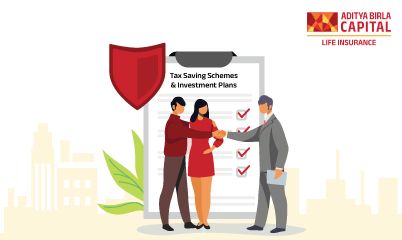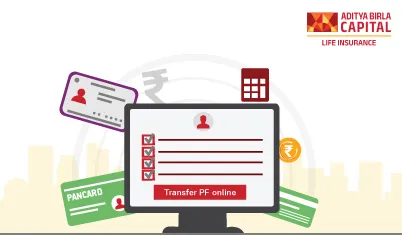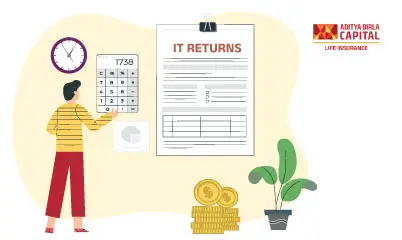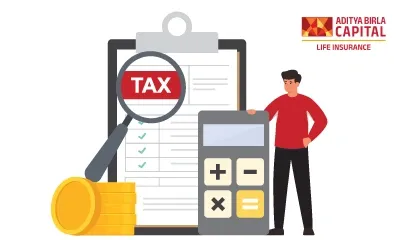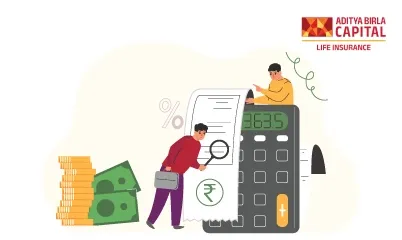Aditya Birla Sun Life Insurance Company Limited
Tax Deducted At Source: Meaning, Returns, Filing And Due Dates

Plan Smarter, Live Better!

Thank you for your details. We will reach out to you shortly.

Currently we are facing some issue. Please try after sometime.


- Table of Contents
What is TDS?
TDS is deducted from different types of payment that is made to a person, whether it is salary, rent, any type of fees, commission, interest, etc. The payer deducts the TDS while making the payment. There are different income tax slabs and accordingly, the TDS is deducted during the time of payment.
Types of TDS
Listed below are some of the sources of income that qualify for TDS, full form Tax Deducted at Source:
- Receiving accumulated taxable part of PF
- Interest received on securities
- Dividends received on the company's shares and on mutual funds
- Interest other than interest on securities (fixed deposit interest)
- Winnings from crosswords, lotteries or any game
- Winnings from horse races
- Payment of contractors and sub-contractors
- Payments on account of the repurchase of units by mutual funds or UTI
- Payment in respect of deposits under the National Savings Scheme
- Life insurance policies not exempt under Section 10(10D)**
- Insurance commission received by an individual
- Commission, prize etc., on sale of lottery tickets
- The commission received except for Insurance Commission
- Sales proceeds from property
- Rent payment by HUF or individual exceeding ₹50,000 per month
- Cash withdrawal
- Payment of professional fees, etc.
- Rental income from plant and machinery
- Rental Income from immovable property
TDS Rates
| Section | Deductee* | Nature of transaction | Threshold Limit (Rs) | TDS Rate |
| 192 | R, NR | Payment of salary | Basic exemption limit of employee | Normal Slab Rates |
| 192A | R, NR | Premature withdrawal from EPF | 50,000 | 10% Budget 2023: TDS rate for EPF withdrawals without a PAN number is now 20%, from the previous maximum marginal rate |
| 193 | R | Interest on securities | Debentures- 5,000 8% Savings (Taxable) Bonds 2003 or 7.75% Savings (Taxable) Bonds 2018- 10,000 Other securities- No limit | 10% Budget 2023: Exemption of TDS on interest from listed debentures has been removed. Therefore, tax has to be deducted on interest on such specified securities. |
| 194 | R | Payment of any dividend | 10,000 | 10% |
| 194A | R | Interest from other than interest from securities (from deposits with banks/post office/co-operative society) | Senior Citizens- 1,00,000 Others- 50,000 | 10% |
| 194A | R | Interest from other than interest on securities u/s 193 and interest from other than banks/post office/co-operative society For e.g., interest from friends and relatives. | 10,000 | 10% |
| 194B | R, NR, FC | Income from lottery winnings, card games, crossword puzzles, and other games of any type | Aggregate income from lottery winnings, card games, crossword puzzles etc- 10,000 Online Gamine- Refer 194BA | 30% |
| 194BA | R, NR, FC | Income from online games | Nil | 30% |
| 194BB | R, NR, FC | Income from horse race winnings | 10,000 Aggregate winnings during a financial year not single transaction | 30% |
Budget 2025 Update: Reduction of TDS on Life Insurance Payouts
The Budget 2025 has a significant change to the Tax Deducted at Source (TDS) applicable to life insurance payouts under Section 194DA of the Income Tax Act.
Specifically, the TDS rate on the income component of life insurance payouts is to be reduced from the existing 5% to 2%. This change is scheduled to take effect from October 1, 2024.
This reduction will directly benefit individuals receiving payouts from life insurance policies where the amount exceeds ₹1 lakh and is not exempt under Section 10(10D)**. It will result in a lower TDS deduction, thereby increasing the immediate net amount received by policyholders.
Forms Required
Form 27EQ
Form 27EQ contains details of the tax collected at source (TCS). Filing Form 27EQ quarterly is mandatory for both private and government organizations. Due Dates
● 1st Quarter: July 31, 2025 ● 2nd Quarter: October 31, 2025 ● 3rd Quarter: January 31, 2026 ● 4th Quarter: May 31, 2026
Important dates for TDS payment 2024
A TDS Certificate has to be issued by the Deductor to the assessee. Let us take a look at some of the important dates for TDS payment 2024:
| Form | Frequency | Due Date |
| Form 16 - TDS on Salary Payment | Annual | May 31 |
| Form 16 A - TDS on Non-Salary Payments | Quarterly | 15 days from the date of return filing |
| Form 16 B - TDS on Property Sale | Every transaction | 15 days from the date of return filing |
| Form 16 C- TDS on Rent | Every transaction | 15 days from the date of return filing |
How Interest is Calculated for Late TDS Payment?
TDS payment can be done even if the deadline has crossed. However, interest is charged on the late payment of the TDS. From the date the TDS was deducted to the date of deposit, the interest on late payment is calculated at 1.5% interest per month. For instance, if the TDS amount is ₹ 8,000 and deduction is 15th March 2021 and the payment for this on 20th November 2021, then the interest will be calculated as follows –
8000 x 1.5% x 9 months
= 120 x 8
= ₹960
The interest amount that is payable should always be from the date at which TDS was deducted to the date at which TDS is paid to the Government.
Example, if the TDS payment is 10th May for a TDS amount deducted on 17th April, and if the TDS payment is delayed, then the interest will be calculated from 17th April and not 10th May. In this case, the interest will calculated using calendar months and in this case it will be considered as 2 months. So, the interest payable is 1.5% x 2 = 3%, and so on.
How can you save on taxes?
-
Leave Travel Allowance If you don't already have a travelling allowance from your employer, you can request your employer to include funding in your salary breakup. So, you can claim a tax deduction on your travelling expenses.
-
Mediclaim Premium Suppose you have a mediclaim and want an exemption on tax. In that case, you can request your insurance policy provider to provide you with an 80D certificate. You need to submit bank statements to prove that you spend some of your income on mediclaim premiums.
-
House Rent Allowance To get a tax exemption through this allowance, you will need to present your name, address, landlord's name and PAN number. If the landlord does not have a PAN card, you must present Form 60. Keep in mind that the HRA cannot be more than 50% of your basic salary.
-
Residential Loan Interest If you have a home loan, you can save tax on the interest you pay on the payment. You would have to submit your name, address, PAN of the loan lender and a certificate or bank proof stating that you pay the interest .
-
Tuition Fees If you have children in school, you can save some tax on their education expenses. However, you will have to produce a fee receipt from the school with a valid school stamp.
-
Donations If you have donated a certain amount to a trusted organisation, temple, or prime minister relief funds. You can exempt your taxes on that money too. However, you would have to submit your name, address, organisation's PAN, and registration number.
-
National Pension System (NPS) National Pension System is a government investment scheme for the elderly. You won't have to pay taxes on the premiums. Plus, when you retire, you will receive the plan's returns.
-
Section 80C Benefits There are many tax savings and investment schemes introduced by the Indian government. Examples of such schemes are National Pension Plan, Public Provident Fund, Sukanya Samridhi Yojana, etc.
How and when to file TDS returns?
TDS or Tax Deduced at Source is the tool that government uses to collect taxes from the citizens. This tool also prevents tax leakage. The deductor must submit the TDS returns every three months to the government. If the deductor fails to do so before the due date, there are subject to a penalty for late payment. In keeping with advancements in technology, the government now offers an online facility to file TDS.
You simply need to submit the required forms online.
Let's see how can one file for TDS returns online:
- Fill in the form 27A, and accurately enter the information in every column.
- Now you will have to enter the tax that was deducted at the source along with the total amount.
- Enter the correct TAN of the organisation in the form.
- You would also have to provide the tax details, challan number, and payment mode. Ensure you enter the correct challan number; an incorrect challan number may lead to rejection of the form.
- If all the information you have entered is correct, you will receive confirmation and receipt. This means you have filed your TDS return successfully.
- If in case your application is rejected, you will receive a rejection memo with a reason for rejection. You will have to resubmit the submission with the correct information for filing the TDS return.
Eligibility Criteria
An organisation or employer with a registered TAN number can file a TDS return. Under the Income Tax Act, any employer who makes payment to its employees should deduct the TDS at the time of payment. All the TDS filings should be done before the due date.
Forms Required
-
Form 24Q According to section 192 of income tax, an employer must deduct the TDS from its employee's salary at the time of payment. And it is mandatory for the employer to file the TDS return quarterly. In form 24Q the employer needs to fill in the correct information about the tax details, the total amount paid by the employee and the mode of payment used.
-
Form 26Q 26Q is used to deduct taxes on payments other than the salary of the employee. The TDS deducted and the total amount paid should be included on the form. A 26 Q must also be filed every three months.
-
Form 27Q For foreigners and NRIs form 27Q is used for deduction of the TDS. The form should be filed quarterly a year and before the due date. The information on the form must include the payment details like total amount paid, tax deducted and mode of payment.
-
Form 27EQ Form 27EQ has every detail of the tax collected at the source. Filing the 27EQ quarterly is mandatory for both private and government organisations.
Due dates
- 1ˢᵗ Quarter: 31 July 2025
- 2ⁿᵈ Quarter: 31 October 2025
- 3ʳᵈ Quarter: 31 January 2026
- 4ᵗʰ Quarter: 31 May 2026
Thank you for your details. We will reach out to you shortly.
Thanks for reaching out. Currently we are facing some issue.
Buy ₹1 Crore Term Insurance at Just ₹575/month1
ABSLI DigiShield Plan
Life cover up to 100 years of age.
Joint Cover Option
Inbuilt Terminal Illness Benefit
Tax Benefit^
Return of Premium Option~
Life Cover
₹1 crore
Premium:
₹575/month1
Most Popular Calculator
Guaranteed returns after a month¹
**Sec 10(10D) benefit is available subject to fulfilment of conditions specified therein
ADV/5/25-26/207



